From 1–5 August 2023, ICCROM’s flagship programme First Aid and Resilience for Cultural Heritage in Times of Crisis (FAR), in partnership with the US Department of State Ambassadors Fund for Cultural Preservation, the Ministry of Culture and Information Policy of Ukraine (MoCIP) and the National Memorial Complex of Heroes of Heavenly Hundred – Museum of the Revolution of Dignity (Maidan Museum) successfully held a second in-person training in Kyiv, Ukraine. Local coordination for the initiative was provided by the Agency for Cultural Resilience (ACURE) and Heritage Emergency Response Initiative (HERI). The immersive training included two site visits with live demonstrations on how to conduct post-event on-site damage and risk assessments for movable, immovable and intangible heritage.
This training forms part of a nine-month project on developing a GIS-based risk map for cultural heritage – tangible and intangible. By systematically collecting, compiling, analyzing and visualizing data on damage and risk, the project will help identify priorities for first aid, risk reduction and post-war recovery and develop a risk-informed approach for protecting heritage at the national level.
The project is generously supported by the US Department of State Ambassadors Fund for Cultural Preservation (AFCP). The project is phase one of our four-phase strategy to develop capacities for crisis response and recovery of heritage in Ukraine. This strategy was developed by the FAR team based on findings from our investigative mission, which was jointly undertaken by ICCROM-ICOMOS in July 2022. UNESCO and the European Commission’s Directorate-General for Education, Youth, Sport and Culture will be funding some of the other activities listed in our strategy document.
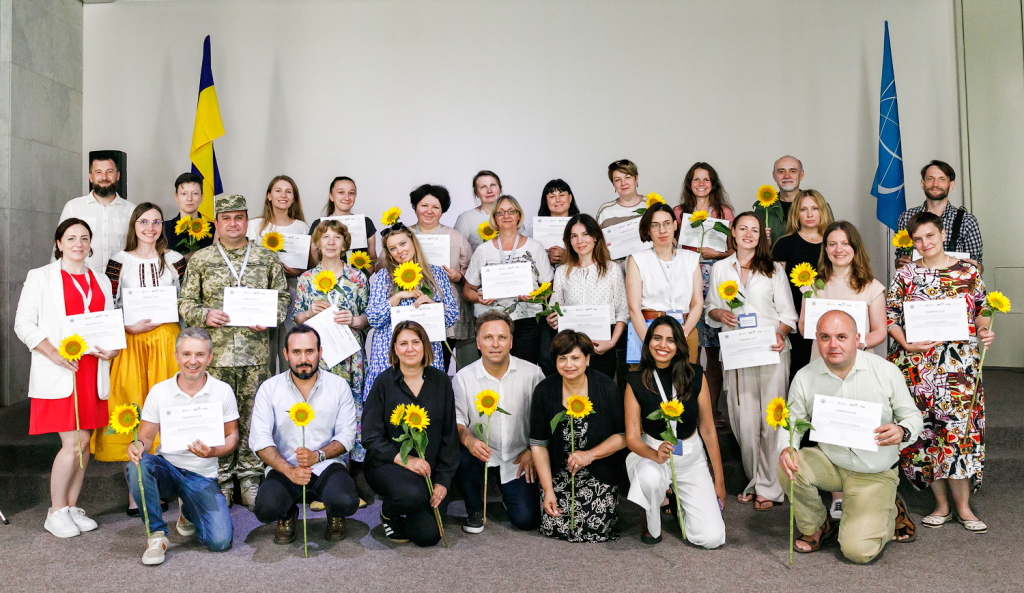 Participants hold their certificates and a sunflower, which signifies peace and resilience in Ukraine.
Participants hold their certificates and a sunflower, which signifies peace and resilience in Ukraine.Credit: Maidan Museum/ICCROM – Bohdan Poshyvailo
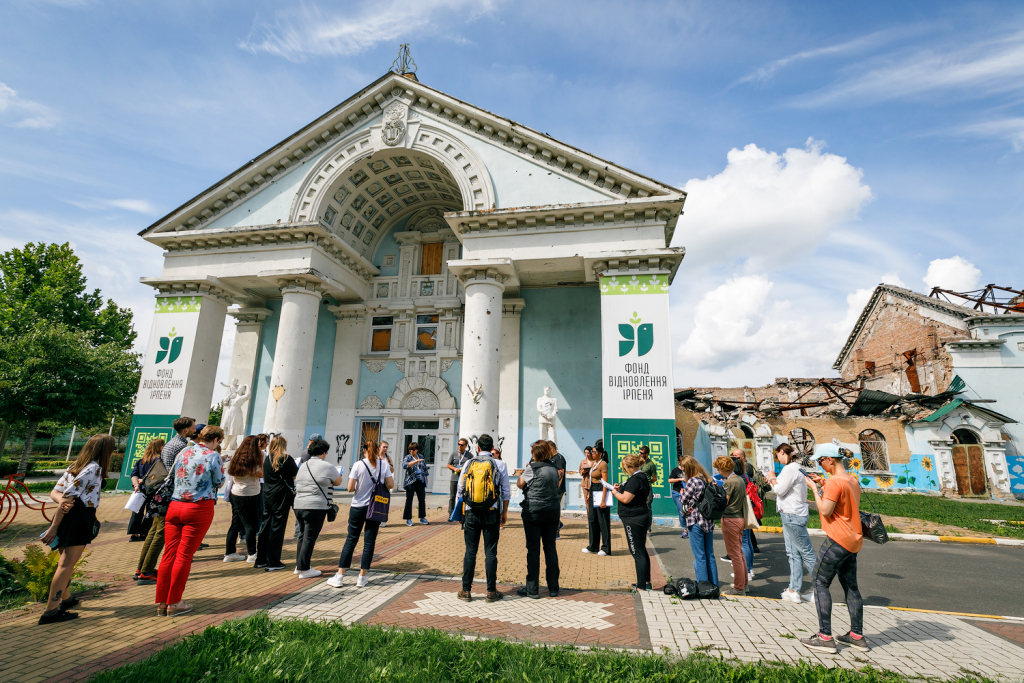 Participants on site conduct damage and risk assessments for movable, immovable and intangible heritage. Credit: Maidan Museum/ICCROM – Bohdan Poshyvailo
Participants on site conduct damage and risk assessments for movable, immovable and intangible heritage. Credit: Maidan Museum/ICCROM – Bohdan Poshyvailo A national team of 23 professionals from five regions at risk from the ongoing war – Kharkiv, Odesa, Donetsk, Chernihiv and Kyiv – represented the diverse disciplines of architects, historians, lawyers, army officers, and library, archive and museum professionals. The methods and workflows introduced during the training are based on ICCROM’s codified and field-tested methodology on first aid to cultural heritage in times of crisis (FAC).
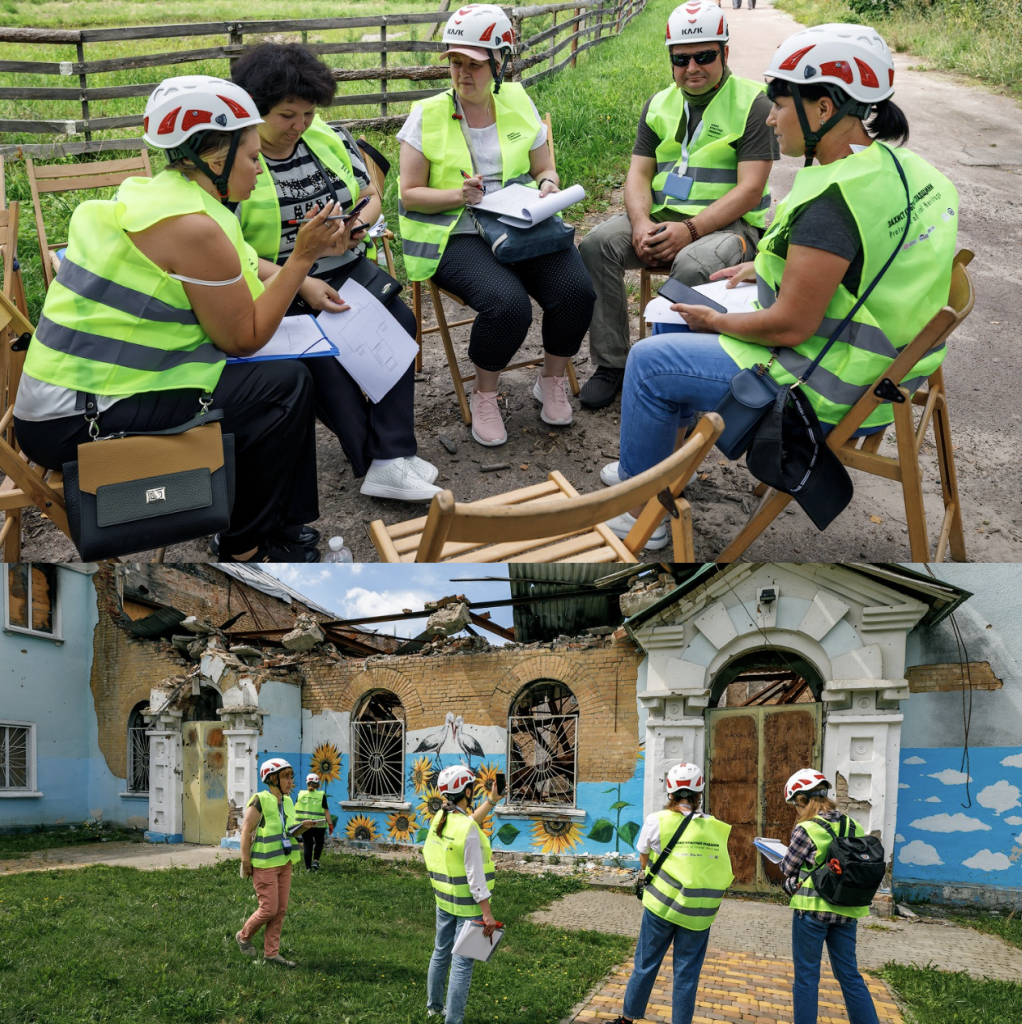 Credit: Maidan Museum/ICCROM – Bohdan Poshyvailo
Credit: Maidan Museum/ICCROM – Bohdan Poshyvailo Through lectures, case examples, site visits and hands-on activities, the participants learned how to mount on-site emergency damage and risk assessment for heritage places in complex emergencies, as well as the basics of developing risk-informed onsite structural and non-structural stabilization measures based on the data collected using on-site damage and risk assessment forms.
Tools and technologies that can be used in emergency documentation were discussed at length during the workshop. Conservation architect Rand Eppich shared best practices for levels of recording damages at heritage places using findings from his scientific paper. Participants were given an opportunity to critically understand when and how tools, such as ICCROM-FAR’s app, photogrammetry, etc., can be used to assist in the recovery of heritage, as well as differences in the levels of their accuracy. Through Ola Salho’s hands-on experience creating detailed damage and risk assessments, they also learned how to draft a floor or site plan, as well as how to observe and mark damages on technical drawings.
"I had no experience in fixing or assessing damage to cultural heritage objects, so I came with a ‘clean sheet’ and great desire. During these days, I gained experience and a lot of knowledge – how to react, what algorithm of actions [to take], and how to use international forms documentation. Since I live and work in the Donetsk region, where the war has been going on for almost ten years, there is a lot of work, but I will fight to document the losses and restore our heritage. Cultural heritage is the heart of the people; it is spiritual and a thread that unites us...”
– Kateryna Zelenska, Workshop Participant, Donetsk Regional Museum of Local History
Testimony translated from Ukrainian into English
Workshop highlights
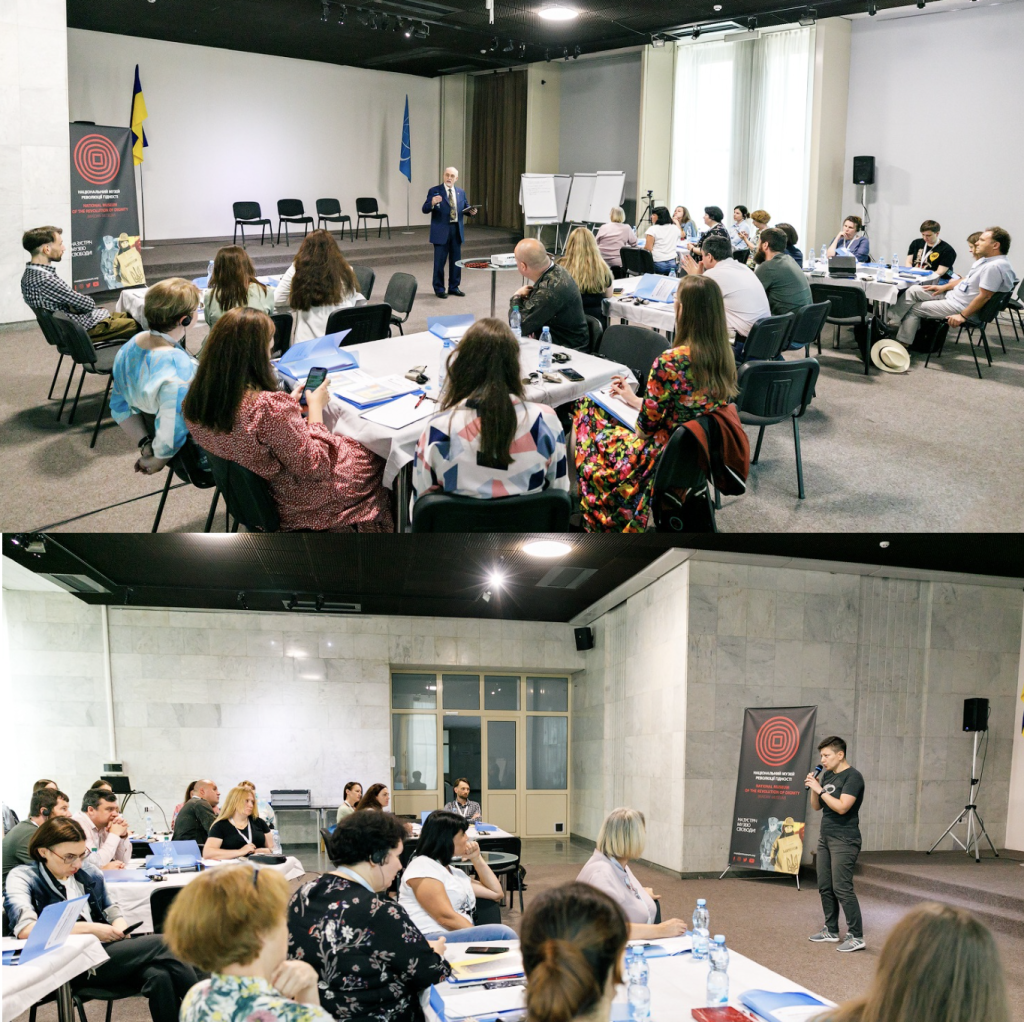 Credit: Maidan Museum/ICCROM – Bohdan Poshyvailo
Credit: Maidan Museum/ICCROM – Bohdan Poshyvailo The workshop was formally launched by inspiring keynote speeches from the Deputy Minister of the Ministry of Culture and information Policy of Ukraine, Ms Kateryna Chuyeva, and Cultural Attache at the US Embassy in Kyiv, Mr Glen Davis.
Ms Chuyeva thoughtfully noted the conscious need for damage and risk assessment and how it can be tailored to the local context, while Mr Davis highlighted how such assessments can lead to long-term, risk-informed decisions towards the recovery of heritage in Ukraine.
ICCROM-FAR’s Senior Programme Leader Aparna Tandon and Programme Assistant Jui Ambani led the participants through a step-by-step methodology of the First Aid to Cultural Heritage in Times of Crisis (FAC) methodology, where damage and risk assessment forms step 2/4.
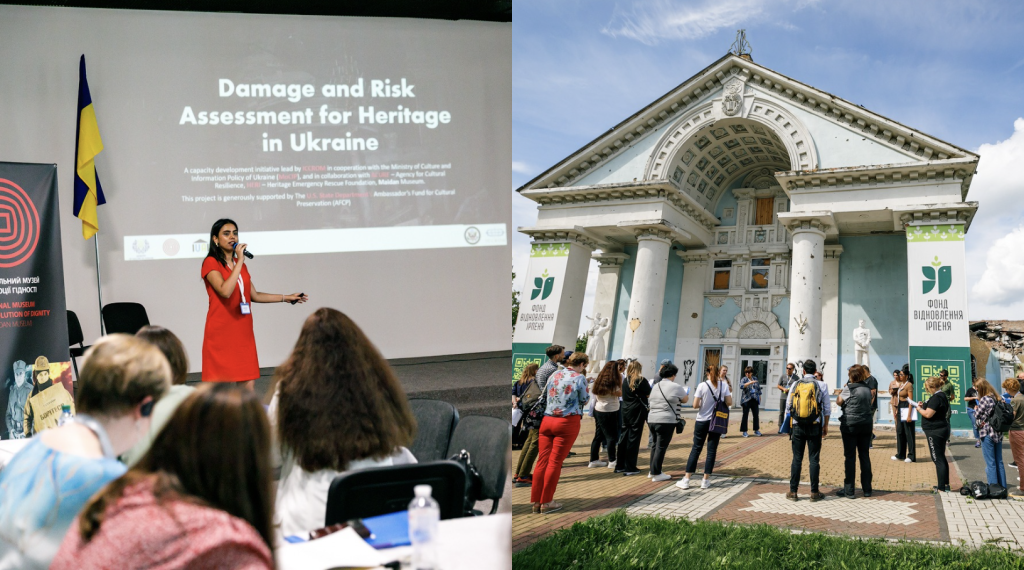 Credit: Maidan Museum/ICCROM – Bohdan Poshyvailo
Credit: Maidan Museum/ICCROM – Bohdan Poshyvailo Mr AbdelHamid Salah, Chairman of FAR’s long-standing partner, the Egyptian Heritage Rescue Foundation (EHRF), provided a case example from Egypt on how this methodology can be implemented on-the-ground after an emergency.
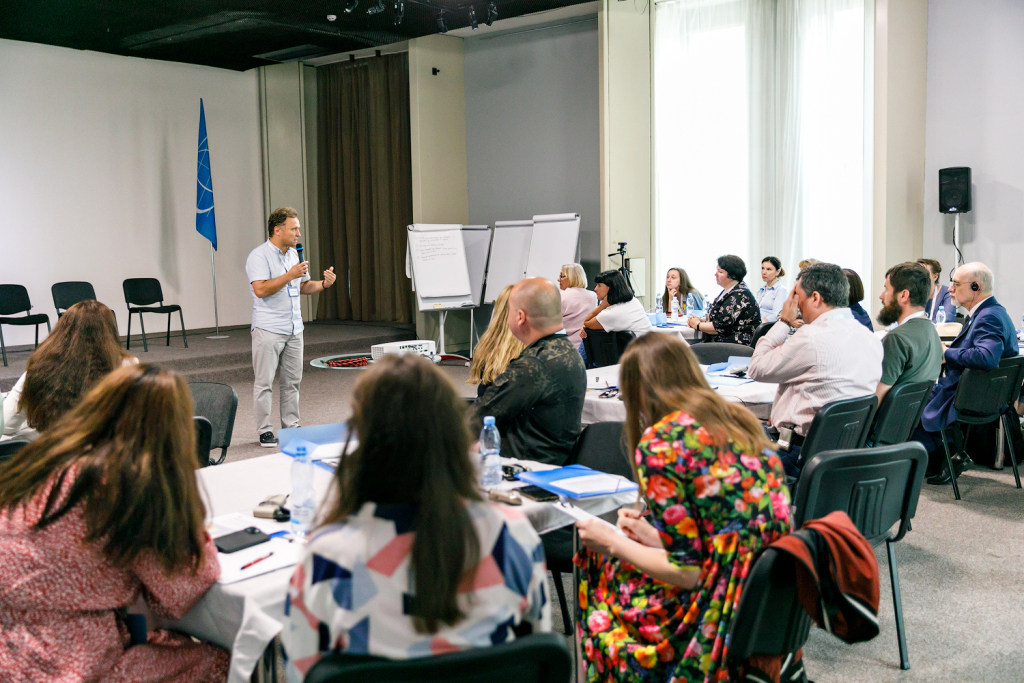 Credit: Maidan Museum/ICCROM – Bohdan Poshyvailo
Credit: Maidan Museum/ICCROM – Bohdan Poshyvailo Mr Ihor Poshyvailo, General Director of the Maidan Museum, co-founder of our local implementing partners ACURE and HERI, and a trained cultural first aider, explained the importance of tailoring this methodology to the Ukrainian context.
Based on the introduction, participants conducted an on-site damage and risk assessment for movable and immovable heritage at the Irpin Central House of Culture: one of the first post-World War II cultural institutions in Ukraine, which was damaged by intensive attacks in March 2022.
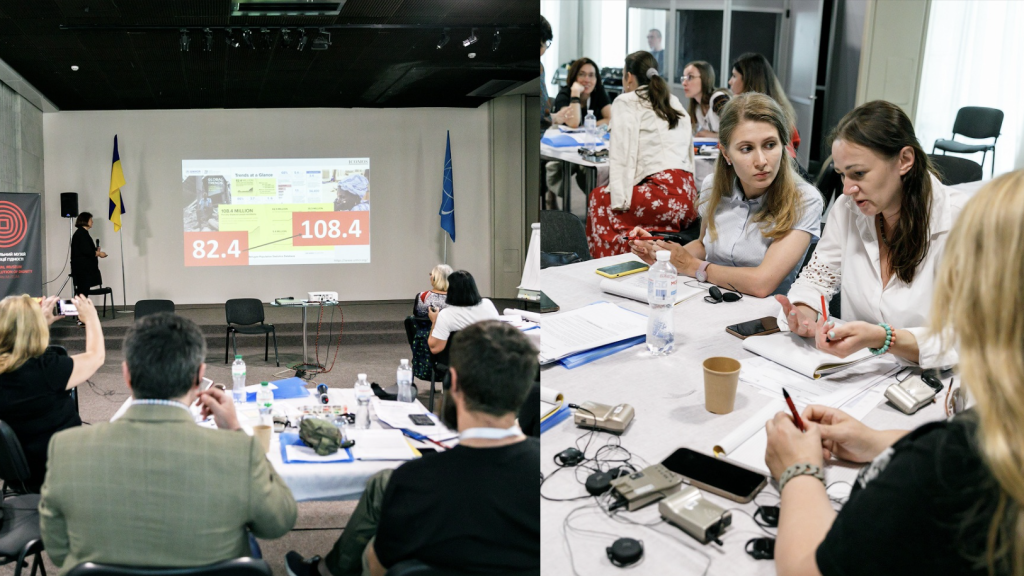 Credit: Maidan Museum/ICCROM – Bohdan Poshyvailo
Credit: Maidan Museum/ICCROM – Bohdan Poshyvailo After studying the results of the site-visit, Aparna Tandon (ICCROM) introduced the participants to the ICCROM-FAR damage and risk assessment forms and highlighted the importance of a standardized framework for collecting data at-scale and designing first aid measures for cultural heritage.
Ms Zeynep Gül Ünal, Vice President of ICOMOS International, walked the participants through key aspects to consider when approaching a heritage building in a complex emergency.
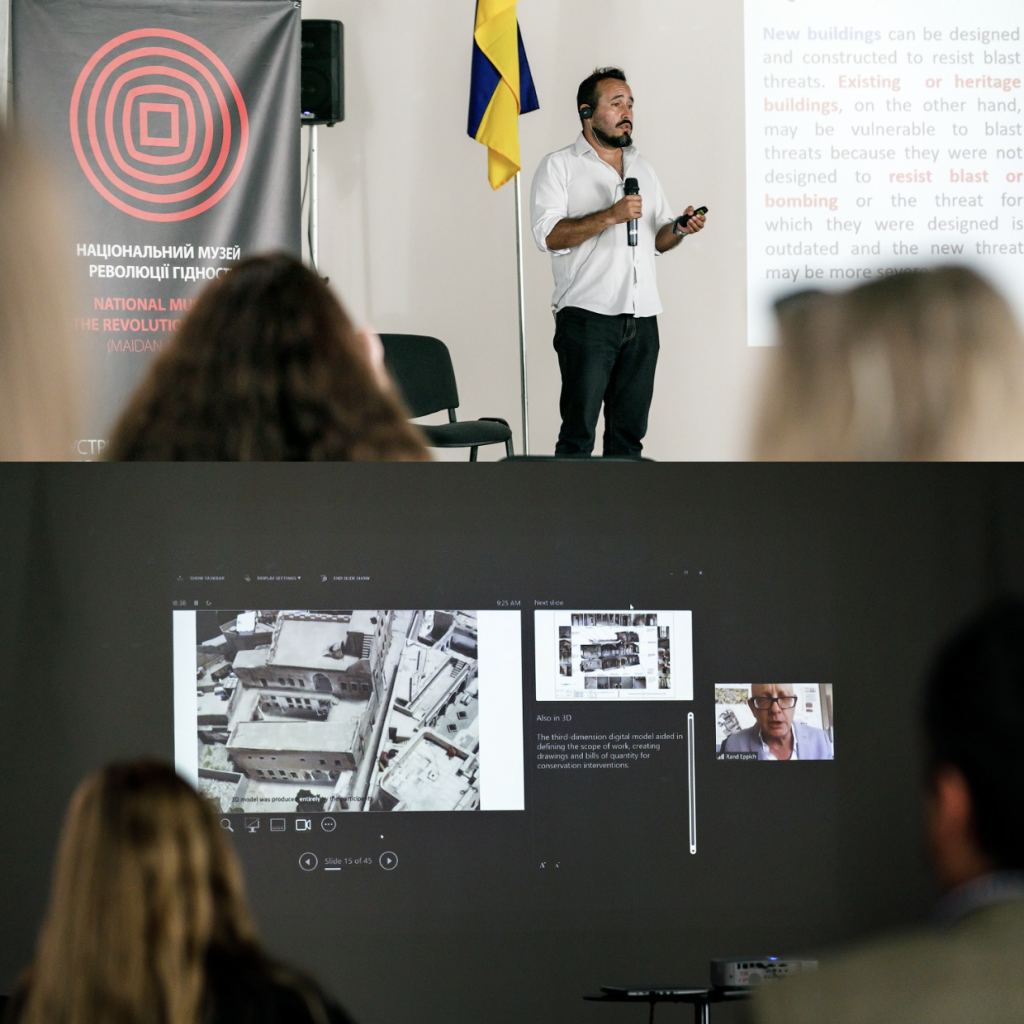 Credit: Maidan Museum/ICCROM – Bohdan Poshyvailo
Credit: Maidan Museum/ICCROM – Bohdan Poshyvailo Mr Rand Eppich, a conservation architect and main collaborator of ICCROM-FAR’s pilot project on analysis of damage and risk assessment data in Ukraine, introduced the participants to photogrammetry, provided them with easy tips and tricks for taking good enough photographs and developing costs for actions identified after analyzing results from an on-site damage and risk assessment for all types of heritage.
ICCROM-FAR team members Jui Ambani and Aparna Tandon then introduced the ICCROM-FAR app for conducting on-site damage and risk assessment, as well as the step-by-step methodology on completing the forms, as well as identifying and recording damages and risks observed.
Mr Pedro Cantor, Structural Engineer and Researcher at the Instituto Superiore Technico at University of Lisbon, and Aparna Tandon (ICCROM) introduced the participants to simple and easy to mount structural and non-structural stabilization measures, within the framework of the FAC methodology.
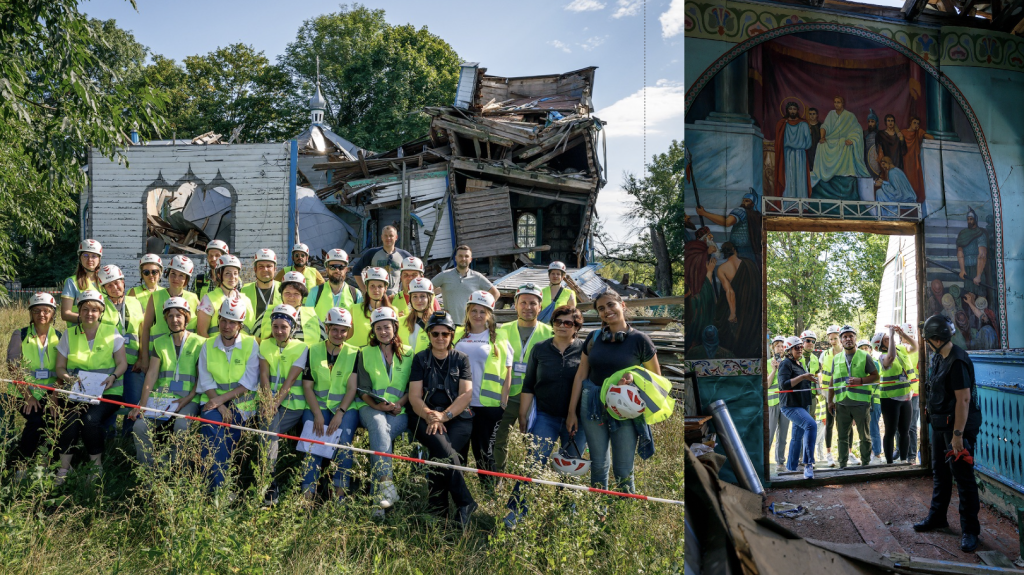 Credit: Maidan Museum/ICCROM – Bohdan Poshyvailo
Credit: Maidan Museum/ICCROM – Bohdan Poshyvailo Participants then participated in a simulation on conducting post-event on-site damage and risk assessments for a 160-year-old wooden church – a monument of national importance – located in the Zhytomyr region, which was damaged by shelling. The forms and data were carefully analyzed and participants reflected on the best format for reporting damages, risks and losses.
Special sessions were dedicated to understanding and assessing damages to intangible heritage practices and loss of cultural bearers, which were led by Aparna Tandon (ICCROM). A stimulating discussion led to participants highlighting the need for a dedicated team to tailor ICCROM-FAR’s forms for assessing damages and risks to intangible heritage to the Ukrainian context.
A certificate ceremony led by the teaching team, Ms Kateryna Chuyeva, Deputy Minister of the Ministry of Culture and information Policy of Ukraine, and Mr Glen Davis, Cultural Attache at the US Embassy in Kyiv, concluded with a beautiful national Ukrainian song sung by a participant. See video below.
"The protection of cultural heritage today is a component of national security. This war in the world is called a war for identity, for heritage. The protection and preservation of our historical memory and cultural identity is not only the responsibility of the cultural sector. The most effective partner in this should be our military; therefore, it is important to create a military unit for the protection of heritage in the ranks of the Armed Forces. Currently, we are developing capabilities in this in the field of our colleagues with the hope that we will form a national team of cultural first aiders from motivated and trained Ukrainians.”
– Ihor Poshyvailo, General director of the Maidan Museum, co-organizer of the Heritage Emergency Response Initiative (HERI)
Testimony translated from Ukrainian into English
Next steps
In cooperation with the Ministry of Culture and information Policy, ACURE, Maidan Museum and HERI, participants will form teams and identify at least 15 at-risk cultural places and practices for mounting expeditions to conduct on-site damage and risk assessments for movable, immovable and intangible heritage. These expeditions will be supported by seed grants, thanks to the US Department of State Ambassadors Fund for Cultural Preservation.
Dedicated online sessions will be organized to follow-up on the progress of all participants and continue tailoring and adapting the damage and risk assessment forms to the Ukrainian context.
The data collected from these expeditions will form the basis for building a GIS-based risk map for cultural heritage, which will help develop risk-informed actions for planning the recovery of heritage at-scale.
"I hope that soon we will see how the knowledge gained during this training will be integrated and embodied in daily practice."
– Kateryna Chuyeva, Deputy Minister of Culture and Information Policy of Ukraine
Testimony translated from Ukrainian into English
Featured: FAR Senior Programme Leader joins emergency mission to Odesa with UNESCO and ICOMOS
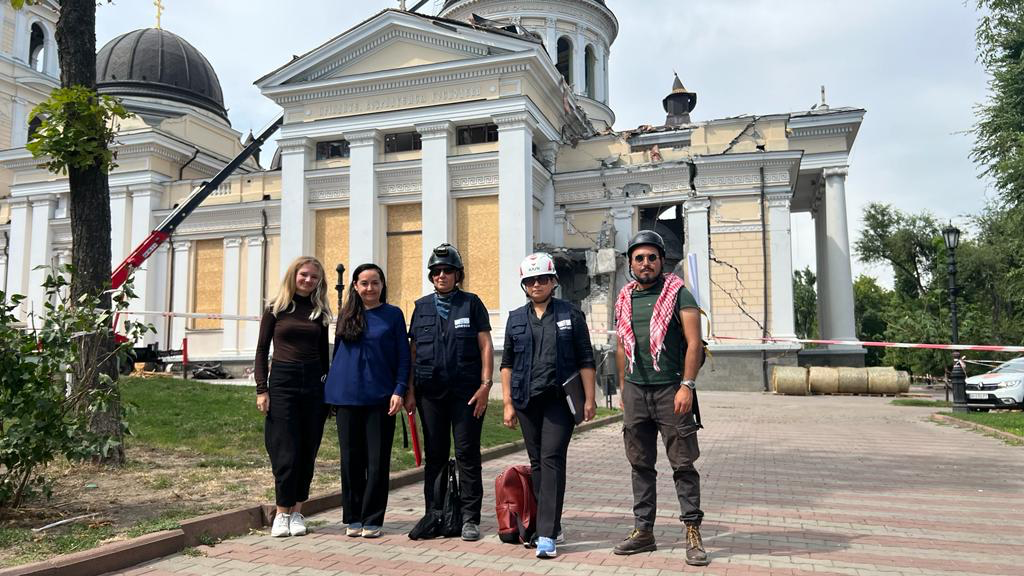 Credit: UNESCO/Yuriy Yurchenko
Credit: UNESCO/Yuriy Yurchenko In response to the colossal damage incurred due to attacks that hit several cultural sites in the city centre of Odesa, Ukraine, home to the World Heritage property ‘The Historic Centre of Odesa,’ UNESCO organized a 2-day emergency mission to conduct damage and risk assessment for affected cultural sites in Odesa.
ICCROM-FAR’s Senior Programme Leader Aparna Tandon, along with Structural Engineer Pedro Cantor, researcher at the Instituto Superiore Technico, University of Lisbon, and Zeynep Gül Ünal, Vice President of ICOMOS, conducted damage and risk assessments for at least ten cultural heritage sites, including several museums inside the World Heritage property, such as the Odesa Archaeological Museum, the Odesa Maritime Museum and the Odesa Literature Museum.
